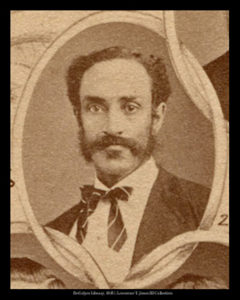
George Ruby
*The birth of George Ruby is celebrated on this date in 1841. He was a Black teacher, journalist, and politician. George Thompson Ruby was born in New York City. His parents were the Rev. Ebenezer Ruby and Jemima Ruby, though their son would claim that his father was an aristocratic white man. He was mulatto.
Ruby grew up with his family just outside Portland, Maine, where he had schooling. Moving to Boston as a young man in 1860, he was hired as a correspondent on the Pine and Palm and sent as a correspondent to Haiti. Ruby returned that year to the United States. After the American Civil War, in January 1864, Ruby moved to Louisiana and began teaching school. First, he taught in a Baptist church in New Orleans and then, as the Union occupation force expanded its educational efforts into the hinterland, in St. Bernard's Parish. The army dropped its responsibility for schooling at the war's end.
The American Missionary Association needed teachers, and Ruby worked for them in New Orleans. When the Freedmen's Bureau schools started, he was hired to teach there. In 1866, he went to Jacksboro in East Feliciana Parish to open a Bureau school there. A white mob attacked him and tried to drive him out. Texas politics In September 1866, with Louisiana schools shutting down for lack of funding, Ruby left for Texas. The Freedmen's Bureau agent assigned him as an agent and teacher in Galveston. Working on setting up and running schools for Blacks, Ruby also helped organize local chapters of the Union League on which mobilization for the newly created Republican party would depend. 1868, he was elected the League's first state president, a powerful political position. Later that year, he was the first Black from Texas to attend the Republican National Convention.
In time, he became editor of the Galveston Standard. Provisional Governor Elisha M. Pease appointed Ruby as a notary public in Galveston. When elections took place for delegates to a state constitutional convention in 1868, Ruby was chosen for the Brazoria, Galveston, and Matagorda counties districts. He was one of ten Blacks elected as delegates. He allied with the more radical end of the party. Deeply disturbed by the conservative compromises that made it into the final document, Ruby worked for some months to have it defeated or rejected by the national government. In the end, he accepted it as the best that could be done if a Republican government was to survive at all. In 1870, he was first elected to the Texas Senate in a very close vote, where he served two terms, in 1870-71 and again in 1873.
He pressed hard for bills protecting the freed people’s civil rights, including a measure opening public conveyances to all, regardless of race, a bill that white members made sure never came to a vote. At the same time, with an eye to his predominantly white constituency, Ruby introduced bills supporting the construction of railroads radiating from Galveston, including several transcontinental projects such as the Southern Pacific and the International & Great Northern. Railroad aid was not a win-win deal; money or lands appropriated to help their projects came at the expense of other needs of the state, such as a well-financed public school system. He served as a delegate to two Republican Party national conventions. He was also appointed as a customs officer in Galveston in 1869.
With close connections to labor organizations in Galveston and as president of the Texas Colored Labor Convention in 1869, Ruby also helped Black workers gain jobs at the Galveston docks after 1870. One historian called Ruby "the most important black politician in Texas during Reconstruction regarding power and ability." He could mobilize Republican voters along the Gulf Coast and Black voters everywhere in Texas. Return to Louisiana and journalism With the return of the Democrats to power in 1874, Ruby left Texas and returned to Louisiana.
He found work in the New Orleans Louisianian, a black Republican newspaper edited by Louisiana's former lieutenant governor, Pinckney B. S. Pinchback. He worked with Pinchback's paper until 1878. That year he became editor of the New Orleans Observer, a paper he established, operating it through the 1880 election. After its demise, he began another, the New Orleans Republic. In the late 1870s, Ruby strongly supported the Exoduster movement. It supported the voluntary migration of freedmen from the Deep South to Kansas to escape segregation, violence, and white supremacy. Still an influential spokesperson for black interests in Louisiana, Ruby died on October 31, 1882, of malaria at his home on Euterpe Street, New Orleans.